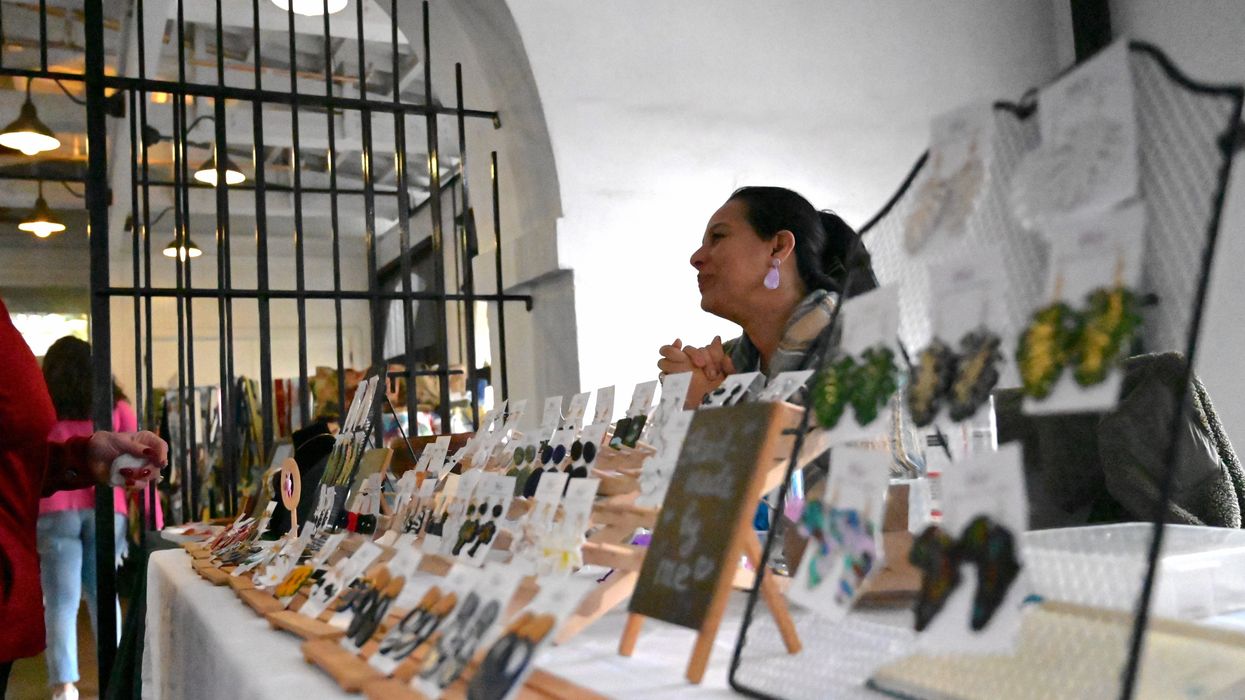Baker is a graduate student at Northwestern's Medill School of Journalism and a former active-duty Marine.
CHARLESTON, S.C. – Inside a vendor’s booth at Charleston’s renowned City Market, Ingrid Ginn gripped a small pair of needle-nosed pliers, twisting a gold wire around itself to finish off a pair of blue and white clay square earrings. A lifelong artist, she opened her small business in 2021 after three decades working in public administration.
Ginn is a wife, a mother, a Colombian immigrant and an American citizen of four years. She has been looking forward to exercising her right to vote in the upcoming 2024 presidential election, in which she plans to cast her ballot for Donald Trump.
She trusts him because he built his own fortune, and she doesn’t believe him to be motivated by personal greed. Ginn pointed to other politicians who’ve sought power and simultaneously become wealthy.
While Trump’s claims about being self-made have been proven false, his appeal to Latino voters like Ginn confirms something that political scientists have noted for years – that while Democrats have historically won the majority of Latino votes in presidential elections, that margin has been narrowing since 2016. And recently polling by The New York Times shows Trump has a 6-point lead among Latino voters, a significant shift since Joe Biden won 60 percent of their votes in 2020.
That shift reflects the increasing generational and ethnic diversity within American Hispanic communities, said Maria Echaveste, who served as a senior policy official during the Clinton administration and now serves on the board of Mi Familia Vota, a Latino-focused civic engagement organization. The Democratic Party has been slow to recognize the nuance within Latino communities, she said, and slow to try to win more Latino votes.
Latinos will make up almost 15 percent of all eligible voters during the 2024 presidential election, but have been largely overlooked as swing voters in recent years, Echaveste said. Democratic leaders have erroneously considered them a monolithic voting bloc.
“They have very incorrectly assumed that Latinos only care about immigration. And that's just not true,” Echaveste said, explaining that most are more concerned about jobs, taxes and the economy when it’s time to vote.
That feeling is true for Ginn.
“Nothing is free in this life,” she told me. “Somebody has to pay for everything,” like health care for illegal immigrants, something that falls in line with Ginn’s deeply held Christian beliefs. But U.S. taxpayers, particularly small-business owners like her, are already taxed enough and shouldn’t foot the bill for more free health care, she said. While she wants to see the border improved, the cost of gas is her most pressing priority. Ginn makes the 40-minute commute three to four times a week to sell her earrings, all handmade without molds, to tourists.
Ginn does not support undocumented immigration. It was difficult for her to gain her citizenship, even though she arrived in the U.S. with a fiancee visa, after two years of dating her now-husband. She had since spent years and at least $2,000 trying to get her mother approved for legal immigration from Colombia, where she still lives.
Ginn is drawn to the Republican Party’s conservative values, including tighter borders, lower taxes and a focus on small businesses. Those characteristics have been attractive to much of the Latino community for decades, said Melissa Michelson, a political science professor at Menlo College whose work has focused on Latino voters, who noted that Latino voters have a long history of supporting Republicans.
“The idea that Democrats have recently been losing Latinos to the Republican Party reflects a fairly short-term perspective,” Michelson said. “It’s true that a much larger proportion of Latino voters voted for Obama than voted for Clinton or Biden. But if you rewind a little more, you'll notice that George W. Bush won 40 percent of the Latino vote in 2004, and Ronald Reagan won 35 percent of the Latino vote in 1988.”
Much of Democrats’ false assurance stems from the 2008 election, after which Democrats interpreted Latino voters’ strong support for Obama as a more permanent shift.
“Latinos who voted for a Democrat when it was Obama are now returning to their more Republican perspectives,” Michelson said. “I think it was just a unique situation of the Obama campaign that attracted more Latinos than usual into a multiracial coalition.”
Ginn said while she’s a fervent supporter of Trump, she would have preferred to see South Carolina Sen. Tim Scott or Florida Gov. Ron DeSantis as the Republican nominee. She’s not a fan of former South Carolian Gov. Nikki Haley, who recently lost her home-state primary to Trump and suspended her campaign following additional losses on Super Tuesday, because Ginn believes Haley has betrayed the party by running against her former boss. (Haley served as Trump’s ambassador to the United Nations.)
As for Trump, Ginn believes his false claims that he won in 2020, placing her in the target audience for the Congressional Hispanic Caucus effort to combat Trump’s lies.
Naturalized citizens like Ginn made up one in 10 voters in 2020, according to the Pew Research Center, making political outreach efforts on both sides all the more important.
In each of five states, the number of immigrants who became citizens between 2016 and 2020 was greater than the state’s margin of victory in 2020.
During a lull at the City Market, Ginn took a break from finishing a pair of earrings to share a video of her February 2020 citizen ceremony. Her co-workers at the Charleston County Consolidated 9-1-1 Center presented her with an American flag. She described the ceremony as one of the most meaningful moments in her life.
She considers herself an example of the American dream, having immigrated to the United States and successfully started her own business. “Trump wants to save the nation,” she said. Her only savior is Jesus, Ginn said. But Trump isn’t far behind.



















Trump & Hegseth gave Mark Kelly a huge 2028 gift